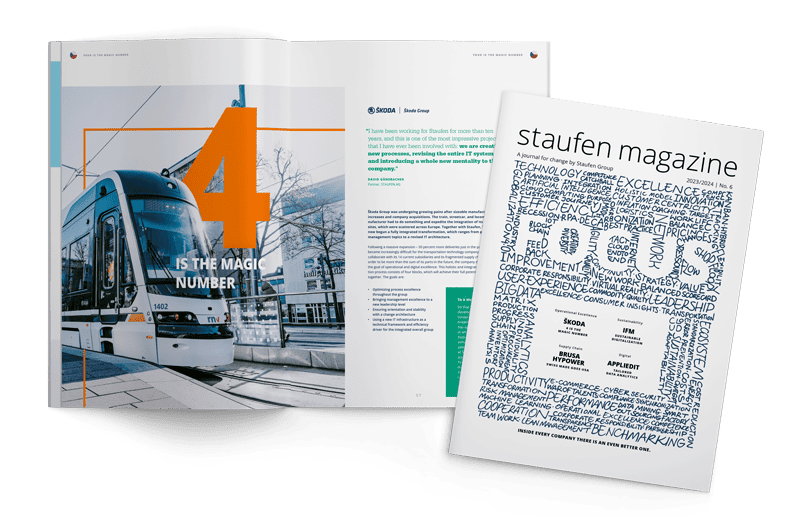
Hanspeter Ebner always likes to be ahead of his time. Even at Ebco GmbH, which he manages, waiting is not an option. The most recent example: the manufacturer of PU foam products, together with Staufen, has determined its CO2 footprint – even if his customers are still cautious when it comes to sustainability.
Whoever frequently travels by aeroplane, has most likely already been in contact with Ebco products. The manufacturer from Albbruck in Germany, near the border to Switzerland, manufactures among other things the armrests and dining tables installed by many aircraft manufacturers. But not only the aviation industry, but also the automotive and furniture industry are convinced by Ebco products of polyurethane (PU) foam.
“Together with Staufen, Ebco now has determined its own CO2 footprint, although the company has not yet been obliged to do so by its customers or by legal requirements,” says Staufen partner Helena Reichmann, and managing director Hanspeter Ebner adds: “Nevertheless, we take the issue very seriously.” The founder of Ebco would like to hand over a sustainable company to the next generation of leaders.
Short decision-making processes and long breath
Sustainability is one of a number of issues that the medium-sized company tackled early on with Staufen compared to other manufacturers of its size. Around ten years ago, the initial aim was to establish lean processes. “We were already on the right track back then. But we had the feeling that we weren’t doing everything right and could be even more efficient,” remembers Ebco boss Ebner. Then the lean processes were digitized. Now, for example, every employee can call up the next order on the screen and, if necessary, get help, without having to leave their workplace. “With us, the decision-making paths are extremely short, ideas are implemented without much bureaucracy. This has been distinguishing us for years and is fun,” says Head of Production Fabian Kulbe.
Ebco has also been working together with Staufen on the company’s strategic direction for several years. As part of this planning, the topic of sustainability was also taken into account and a corresponding project was set up. The determination of their own CO2 footprint that now has taken place helps the manufacturer to find the biggest adjustment screws to consistently reduce its emissions. “A photovoltaic system for our own electricity at the site is important and easy to implement. But there is still a long way to go, the challenges in which are in the details. Here, for example, it is important to procure sustainable components for the PU foam and also to recycle it later,” explains Hanspeter Ebner.
The right product at the right time
With a more sustainable production of PU foam, Ebco could soon reduce the ecological footprint of its products by one third – if the market cooperates. “The sustainability project can only succeed together with the customers,” Staufen consultant Reichmann is convinced. “Here, Ebco, as a passionate pioneer, must continue to persuade.” Especially in the aviation industry, customers are still reluctant. “In aircraft construction, the restrictions are very rigid. Since ongoing projects are rarely changed, there are opportunities in new projects,” says Ebner. He hopes that customers will pay more attention to CO2 with the next generation of aircrafts, then the orders for sustainable products will also come. A newly created strategic sale will help Ebco to offer and deliver the right product to customers at the right time – and a sustainable and recyclable one at that. Fabian Kulbe´s vision: “In five years at the latest, we want to be significantly more sustainable and have implemented many measures from our CO2 footprint project. We also want to become even more digital and position ourselves more broadly as a system supplier in terms of product technology.”
Polyurethanes
Polyurethanes (PU) are plastics that can be hard and brittle or soft and elastic, depending on how they are made. Soft foams are mainly used as upholstery material, for example for car seats or mattresses. Rigid foams are used for thermal insulation. Relatively new areas of application can be found in the aircraft industry and in vehicle construction.
Request the english Magazine now as a digital or print version

YOU MIGHT ALSO BE INTERESTED IN

Latin America on the path to energy transition
Latin America on the path to energy transition! The new management mode is part of the strategy to consolidate Siemens Energy as a one-stop shop that provides services ranging from generation and transmission to an extensive portfolio of products to decarbonize industry.
Read more
走向绿色——长期竞争力的机会
Heat records, forest fires, dried-up rivers and lakes – climate change caused by greenhouse gas (GHG) emissions can no longer be ignored. In Germany, industry is responsible for around one-fifth of GHG emissions.
Read more








